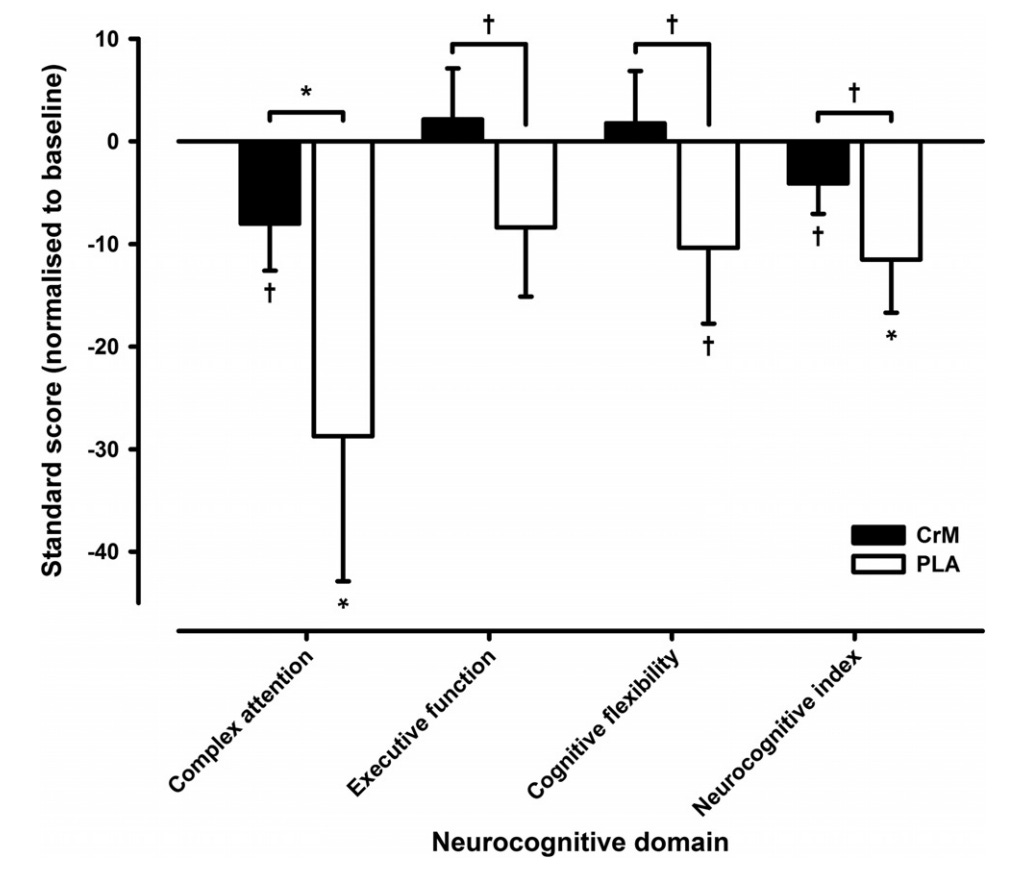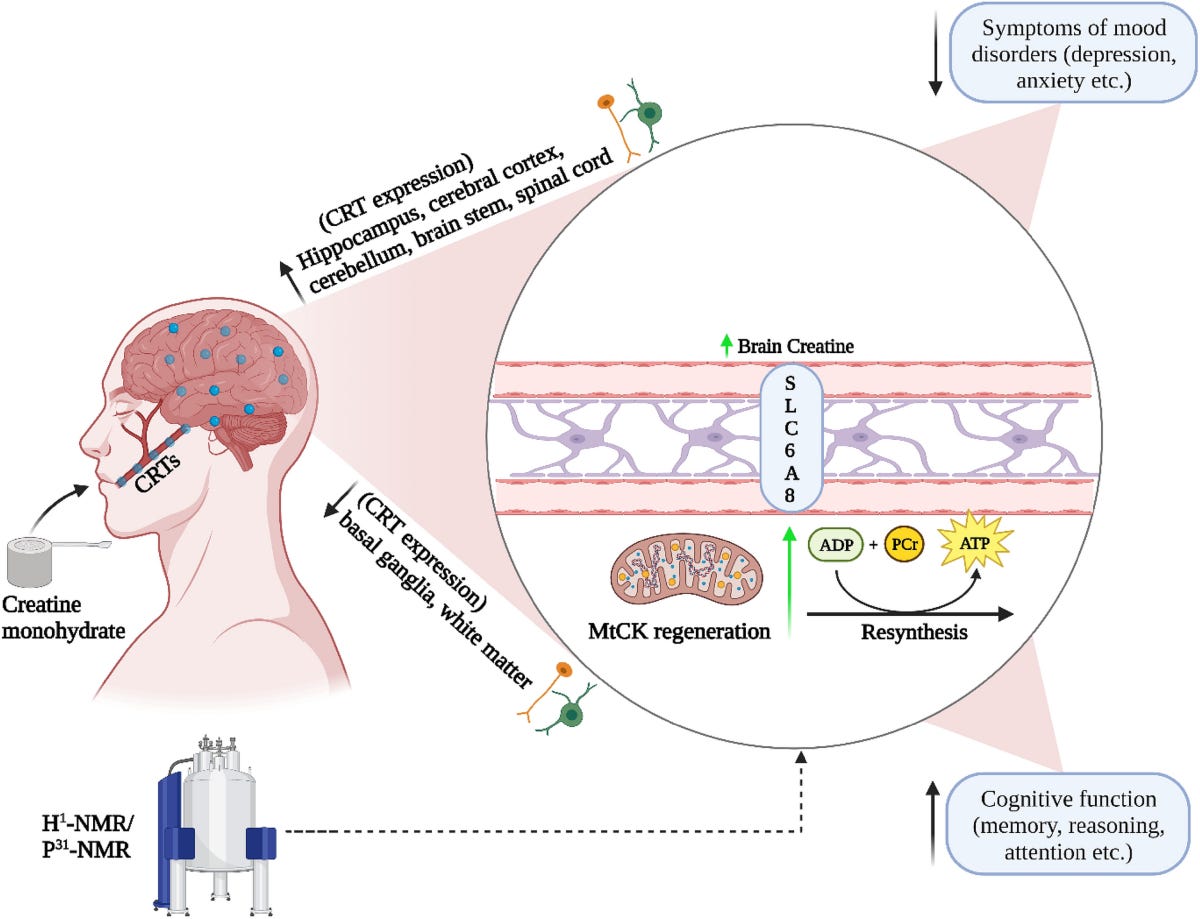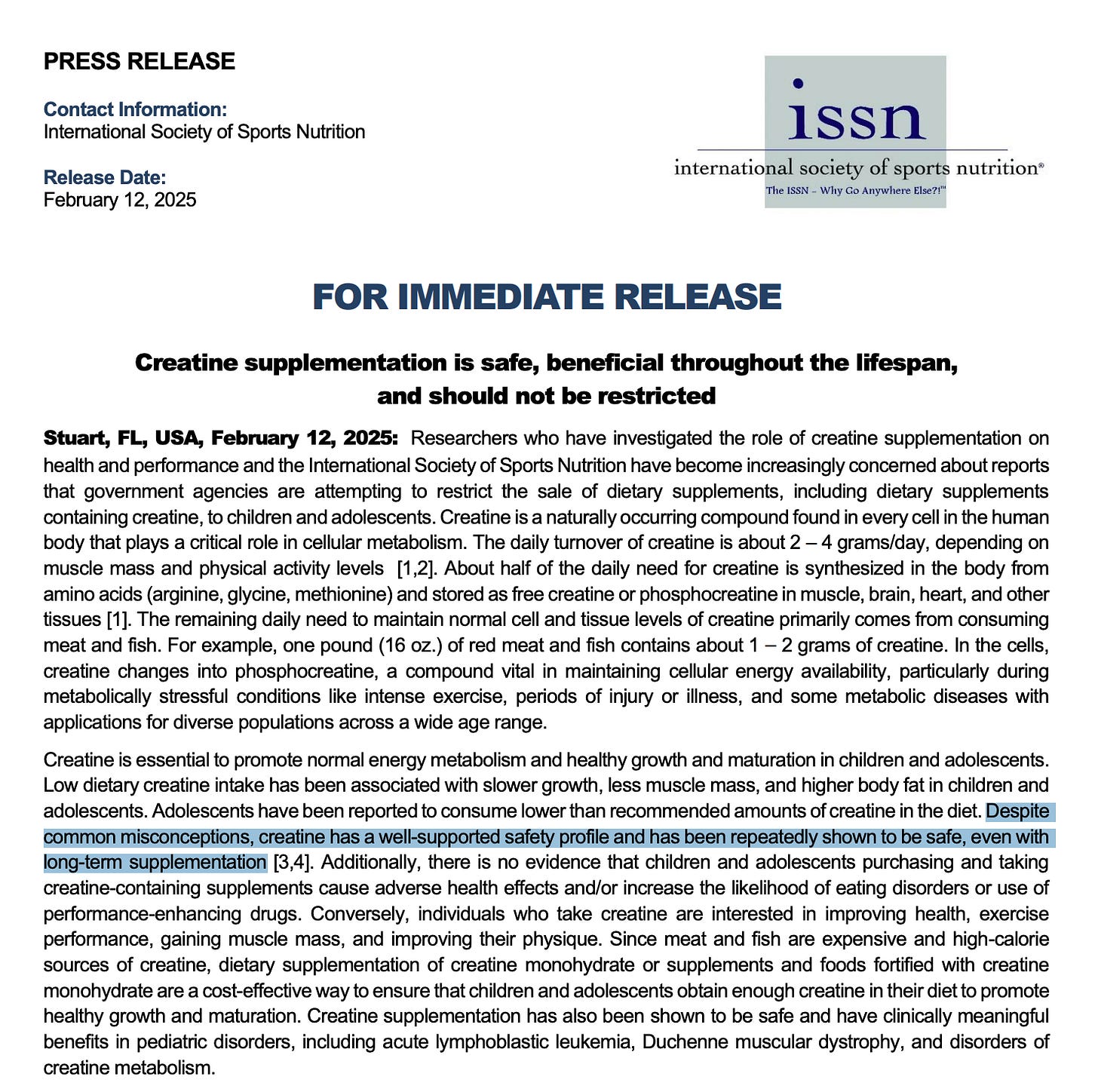Creatine for the Sleep-Deprived Brain
A Backup Energy System for Cognitive Performance
Medical residency was a harsh wake-up call.
I had always heard stories about doctors working 26-hour shifts with no breaks—and, to be honest, I was excited about it. I saw it as a rite of passage, a challenge I was ready to embrace. But nothing could have prepared me for the reality.
On my very first overnight shift, I was in a massive hospital in a new city, responsible for about 40 patients while admitting new unwell patients through the night. At 5 p.m.—when the rest of the world was heading home—I was just getting started. By 4 a.m., I was so mentally drained I remember briefly falling asleep mid-note, my forehead hitting the keyboard as my body gave in. I had never experienced that level of cognitive and physical exhaustion.
And this wasn’t a one-off. I averaged about 1 in every 4 nights on call over most of the rest of the year. The repeated sleep disruption, stress, and mental demands started to add up. I realized I needed to do more than just “push through”—I needed a strategy.
That’s when I began diving into the research and came across something unexpected: creatine.
Long associated with muscle performance and athletics, creatine has also emerged as a potent tool for supporting brain energy metabolism—especially under stress. From overnight shifts to oxygen deprivation, the growing evidence suggests that creatine can help sustain attention, memory, and decision-making during periods of cognitive strain.
In this article, we’ll walk through the science, mechanisms, and practical protocols for using creatine to help protect your brain when energy is in short supply.
Creatine Under Brain Stress: What the Research Shows
Let’s review the evidence from real-world studies where creatine was put to the test under conditions of energy stress: sleep deprivation and hypoxia (low oxygen).
1. McMorris et al., 2006 – 24 Hours of Sleep Deprivation
In a 2006 study by McMorris and colleagues, healthy adults were divided into two groups. One group received a high dose of creatine— 20 grams per day for seven days—while the other group received a placebo. After the supplementation period, both groups were kept awake for 24 hours under conditions of intermittent, mild exercise designed to standardize energy expenditure among participants. A comprehensive battery of cognitive tests was administered throughout the night to assess working memory, reaction time, and overall mood and fatigue.
Key Findings:
Reaction Time: Creatine users exhibited significantly less slowing of reaction time compared to the placebo group.
Executive Function: Participants in the creatine group performed better on tests of executive function, such as random movement generation at 24 hours of sleep deprivation.
Subjective Fatigue: Creatine-supplemented subjects reported less fatigue by the end of the 24-hour period.
This study was pivotal in demonstrating that creatine supplementation can preserve cognitive function during prolonged wakefulness, a finding that is highly relevant for those in high-stress, sleep-deprived situations.
2. McMorris et al., 2007 – 36 Hours Without Sleep
Building on the previous work, McMorris and colleagues extended their protocol to a 36-hour period of sleep deprivation. Again, healthy adults were given 20 grams of creatine per day for a week, and then subjected to continuous wakefulness without sleep while performing even more intense intermittent moderate-intensity exercise.
Key Findings:
Cognitive Performance: At 36 hours, the creatine group outperformed placebo in tasks requiring central executive functioning (skills like working memory, decision-making, and mental flexibility—essential for handling complex tasks under pressure).
These results reinforce that creatine can help preserve executive function and cognitive stability when the brain is under extreme metabolic strain, such as during extended periods of sleep deprivation.
3. Gordji-Nejad et al., 2024 – Single High Dose During Sleep Deprivation
A more recent study by Gordji-Nejad and colleagues examined whether a single, large dose of creatine could counteract the effects of partial sleep deprivation. Participants received a dose of 0.35 g/kg—roughly equivalent to 25–30 grams—just a few hours before undergoing a 21-hour period of sleep deprivation. Advanced magnetic resonance spectroscopy (MR spectroscopy) was used to assess changes in brain energy metabolites, including phosphocreatine (PCr) and ATP.
Key Findings:
Rapid Energy Boost: The high-dose creatine led to a rapid increase in brain phosphocreatine, ATP, and other high-energy phosphate stores.
Enhanced Cognitive Performance: Participants who received creatine demonstrated better performance on tasks measuring cognitive speed and working memory. In some cases, their performance during sleep deprivation even surpassed their own baseline levels.
Time Course: The peak effect occurred approximately four hours after ingestion, with the benefits lasting for up to nine hours.
This study clearly indicates that even a single dose of creatine can rapidly reverse energy deficits in the brain, making it a valuable tool for acute situations such as unexpected overnight calls or jet lag.
.
4. Turner et al., 2015 – Hypoxia and Creatine
Turner and colleagues provided additional insight by investigating creatine’s effects under conditions of hypoxia—an environment in which oxygen levels are severely reduced, akin to high-altitude conditions. In this study, fifteen healthy adults supplemented with creatine (20 g/day for seven days) were exposed to 90 minutes of breathing air with only 10% oxygen.
Key Findings:
Cognitive Preservation: Under hypoxic conditions, cognitive scores for attention and executive function declined. However, in the creatine group, these cognitive measures were maintained at levels nearly comparable to normal conditions.
Neural Energy Metrics: The study found that creatine supplementation led to a significant increase in brain phosphocreatine levels (over 9%) and an increase in corticomotor excitability by 70%.
Implications: Despite severe oxygen deprivation, creatine helped sustain the brain’s energy reserves, thereby preserving cognitive function.
Turner et al.’s findings underscore the remarkable ability of creatine to support rapid ATP generation and neural energy production during times of acute stress, whether from sleep loss or low oxygen. This supports the concept that creatine acts as a crucial energy safety net for the brain under diverse stress conditions.
5. Kondo et al., 2016 – Dosing Strategies: 2 g vs. 4 g vs. 10 g
In a study focusing on adolescent females with treatment-resistant depression, Kondo and colleagues used advanced 31-phosphorus MR spectroscopy to measure brain phosphocreatine levels. Although the study population consisted of female teens on SSRI antidepressants, the findings are highly relevant for understanding creatine’s impact on brain energy metabolism under stress.
Study Design:
Participants were randomly assigned to receive either 2 g, 4 g, or 10 g of creatine daily for eight weeks, or a placebo.
The primary measurement was phosphocreatine (PCr) levels in the frontal lobe, assessed using 31P-MRS.
Depression scores were also monitored, though the focus here is on the energy metrics.
Key Findings:
The groups receiving 2 g and 4 g of creatine showed modest increases in brain PCr levels, approximately 4%.
In contrast, the group receiving 10 g daily exhibited a significantly greater increase in PCr, nearly double that of the lower-dose groups at about 9%.
Importantly, no major side effects or kidney issues were reported at the 10 g dose, addressing common safety concerns.
Interpretation: Kondo’s study provides evidence that a higher dose of creatine—around 10 g per day—may be optimal for saturating brain energy reserves. This finding challenges the conventional 3–5 g dose typically recommended for muscle performance and suggests that for cognitive resilience, higher dosing could be more beneficial.
Mechanism: How Creatine Supports the Sleep-Deprived Brain
Across several studies, a clear pattern emerges: creatine helps protect the brain under energy-depleting conditions.
Rapid ATP Resynthesis: Creatine donates phosphate groups to regenerate ATP, sustaining neuron function during metabolic stress.
Mitochondrial Stability: It improves mitochondrial function and reduces reactive oxygen species (ROS), especially under hypoxia.
Network Stability: It helps preserve frontoparietal network activity, essential for executive tasks and working memory.
How to Use It: Creatine for Mental Performance
While creatine will not replace sleep, it may help delay or blunt cognitive decline during periods of unavoidable sleep loss or extreme stress. For those just starting, a loading phase of 20 g per day—split into four doses over 5–7 days—may help achieve saturation of brain creatine stores. Based on the above studies, a maintenance dose of 10 g per day might be optimal for saturating brain stores during high-stress situations, such as night shifts, exams, high altitude, or prolonged wakefulness.
Protocols:
Loading Phase: 20 g/day split into four doses for the first 5–7 days to rapidly maximize creatine saturation.
General Maintenance: Approximately 5 g/day is sufficient for muscle support and growth, and likely supports everyday cognitive health.
Cognitive Support: 10 g/day may provide additional benefit for cognitive health given Kondo’s findings of increase brain creatine.
Single High-Dose Strategy: A dose of approximately 0.3–0.35 g/kg (around 25–30 g for me) taken 2–4 hours before prolonged wakefulness can offer immediate support. However, since I already take 10g a day, I will usually only go up to 15 g since my baseline creatine reserves are already likely saturated. Further research is needed to determine the optimal dosing strategy for maximal cognitive benefit during sleep deprivation.
Administration: Creatine can be taken at any time of day; splitting the dose (e.g., 5 g in the morning and 5 g in the evening) may improve tolerability.
Safety Considerations: Creatine has been extensively studied and is generally safe for healthy individuals when taken as directed. The International Society of Sports Nutrition recently stated that “Despite common misconceptions, creatine has a well-supported safety profile and has been repeatedly shown to be safe, even with long-term supplementation” However, if you have pre-existing medical conditions, consult your doctor before starting supplementation.
Key Takeaways
Brain Energy Support: Creatine rapidly regenerates ATP through the phosphocreatine system, acting as a backup energy source during stress.
Cognitive Resilience: Creatine helps maintain cognitive performance during periods of brain stress—like sleep deprivation or low oxygen—by supporting energy availability and executive function.
Dosing Strategies:
Acute: 25–30 g can boost cognitive function for ~9 hours during sleep deprivation
Maintenance: 10 g/day may be ideal during high-stress periods
General: 5 g/day likely supports daily brain and muscle performance
Final Thoughts
Creatine acts like a backup energy system for your brain by rapidly regenerating ATP during times of stress, helping to maintain cognitive function when energy is low. Whether you’re a doctor on long shifts, a pilot facing extended duty hours, a sleep-deprived parent who needs to perform at work the next day, or a student racing to meet a deadline, creatine offers an effective, evidence-based solution to keep your mind sharp under pressure.
Thanks for reading—I'm here to share practical, evidence-based tools to help you perform at your best. If this was helpful, consider subscribing and let me know what you'd like to see next.









This is an interesting article, but I would want to know what's causing the sleep deprivation before using a creatine supplement, which is of course naturally produced by the body. In the case of sleep deprivation, a supplement may just be a band-aid. Personally I think creatine works best to enhance, not compensate.
Interesting, any research on creatine effects on ND brain?